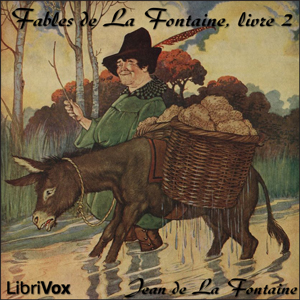
« Le second livre des Fables de La Fontaine confirme le grand talent du plus célèbre fabuliste. Son art achevé de l’expression du verbe qu’il place dans la bouche d’un règne animal complice malgré lui de nos travers, ajoute au plaisir d’une langue savoureuse maniée avec la plus grande dextérité. Allez! avez-vous le goût difficile? »
(Jean Lambert)

Other Audiobook
Audiobook: Lecture, tome 4
La Lecture était une revue littéraire bi-mensuelle française de la fin du 19e siècle, publiant
Audiobook: Mercader de Venecia
Un mercader asume una deuda de tres mil ducados para ayudar a un gran amigo,
Audiobook: The Admirable Crichton
From the author of Peter Pan: Lord Loam, a British peer, considers class divisions to
Audiobook: Short Story Collection Vol. 061
LibriVox readers bring you 20 short works of fiction in the public domain. This collection
Audiobook: Caspar Hauser oder die Trägheit des Herzens
Ein Roman über den berühmten Findling Kaspar Hauser (angeblich: 30.4.1812 – 17. 12. 1833 in
Audiobook: Anatomy of the Human Body, Part 1 (Gray’s Anatomy)
Henry Gray’s classic anatomy textbook was first published in 1858 and has been in continuous
Audiobook: Baseball Joe on the School Nine
“Baseball Joe” Matson’s great ambition is to go to boarding school and play on the
Audiobook: World’s Best Poetry, Volume 1: Home and Friendship (Part 1)
The first of ten volumes of poetry edited by Canadian poet laureate Bliss Carman (1861-1929).
Audiobook: Faerie Queene (version 2)
Spenser planned a 24-book romance-epic consisting of two parts, of which he completed half of
Audiobook: H.M.I.: Some Passages in the Life of One of H.M. Inspectors of Schools
Sneyd-Kinnersley was an Inspector of Schools in a period when regulations were rapidly changing and
Audiobook: Three Men on the Bummel
Some time after “Three Men in a Boat”, George, Harris and Jerome decided to go
Audiobook: Aitreya-Aranyaka Upanishad
The word Upanishad (upa-ni-shad) consists of, “Upa” means “near;” “ni” means “down;” “shad” means “to